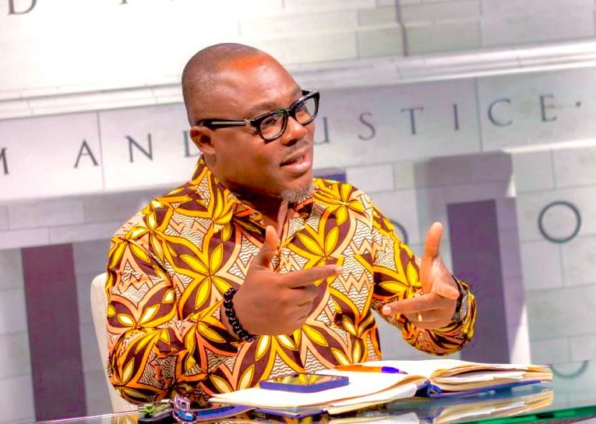Prof. Ransford Gyampo, a senior lecturer at the Political Science Department of the University of Ghana, has raised concerns about the interpretation and enforcement of laws regarding Members of Parliament (MPs) switching political allegiances while in office.
His comments come in the wake of recent developments where MPs from both the New Patriotic Party (NPP) and National Democratic Congress (NDC) have filed to run as independent candidates in the 2024 general elections.
The current Second Deputy Speaker of Parliament, an independent MP, has announced plans to contest the 2024 elections on the NPP’s ticket, while notable NPP MPs, including Cynthia Morrison and K. Asante, have filed to run as independent candidates.
Similarly, an NDC MP has declared intentions to contest as an independent candidate.
These moves have sparked debate about the NPP’s fragile majority in Parliament and the broader implications for party unity.
Prof. Gyampo referred to a precedent set in the 7th Parliament by Speaker Mike Oquaye, when the Fomena MP, who was a member of the NPP, filed as an independent candidate.
At the time, Speaker Oquaye ruled that the MP had effectively vacated his seat.
According to Prof. Gyampo, this ruling was flawed and based on a misreading of the law.
He argued that the NPP should have opposed the decision but instead complied, potentially even orchestrating the situation.
Regrettably, according to Gyampo, Speaker Alban Bagbin of the current 8th Parliament has followed this same erroneous precedent.
He cites Article 97(1)(g) and (h) of the 1992 Constitution, which outlines the circumstances under which MPs must vacate their seats.
The law stipulates that an MP must vacate their seat if they switch political parties during their term or if an independent MP joins a political party.
This provision aims to prevent political defection or “cross-carpeting” within the same parliamentary session.
However, Prof. Gyampo argues that this law was never intended to apply to an MP’s future intentions for another parliamentary term.
It was introduced in the 1969, 1979, and 1992 Constitutions to curb cross-carpeting during a sitting Parliament and not to penalise MPs for their plans in subsequent elections.
To understand the true intent of the law, Gyampo delves into Ghana’s political history.
He recalls the events of the First Republic in 1958, when several opposition MPs defected to the ruling Convention People’s Party (CPP) out of fear, following the arrest of key opposition figures.
This mass defection, he argues, weakened the opposition and paved the way for the CPP to consolidate its power, eventually passing the Republican Constitution with an overwhelming majority in Parliament.
The law against cross-carpeting was thus a response to this historical moment. Its purpose is to prevent MPs from opportunistically switching sides due to intimidation or political gain during their term.
It was designed to maintain political stability and uphold the electoral mandate that MPs receive when they are elected, ensuring they remain aligned with the platform under which they were elected.
Prof. Gyampo stated that the literal interpretation of this law by Speakers Oquaye and Bagbin is misguided.
He pointed out that in 2008, three independent MPs – Joe Osei Wusu, Seth Adjei Baah, and Ofori Kuragu – were allowed to contest the next election on the NPP ticket without vacating their seats in Parliament.
Their seats were not declared vacant simply because they intended to join the NPP in the next parliamentary session.
Instead, the NPP waited until September of the election year to hold primaries for them, demonstrating that it is possible to manage such situations without disrupting parliamentary representation.
Declaring seats vacant due to future intentions, according to Prof Gyampo, stifles representation and denies constituents their voice in Parliament.
He further notes that Article 99 of the 1992 Constitution gives the authority to determine the vacation of seats to the courts, not the Speaker of Parliament or political parties.
In his closing remarks, Prof. Gyampo expressed frustration with the partisan manipulation of legal precedents, warning that distorting history and the law for political expediency today will lead to regrettable consequences in the future.
He called for principled politics and urged leaders to avoid setting dangerous precedents that could undermine Ghana’s democratic process.
“Yesterday when it was wrong, the NPP liked it. But today that it is wrong, they are crying. This is what happens when we choose to do unprincipled politics,” he concluded.
Latest Stories
-
Seize campaign activities, work on rebuilding party – NPP Council of Elders tells members
3 minutes -
We don’t intend to privatise VRA and Bui Power – John Jinapor
9 minutes -
Import substitution strategies in the 24-Hour Economy: A catalyst for Ghana’s practical economic growth
39 minutes -
Chamber of Aquaculture urges President Mahama to nominate a Minister with agribusiness expertise
51 minutes -
Energy Minister-designate sets 6-months for ECG private sector involvement framework
52 minutes -
Mahama should scrap deputy ministerial position for tourism
56 minutes -
Global economy remains resilient, to grow by 3.2% in 2025 – OECD
1 hour -
I’ll focus on the development of the real sector – Dr Ato Forson
1 hour -
Energy sector debt has ballooned to $3bn – John Jinapor
1 hour -
Businesses to see tax reliefs as Ato Forson promises VAT reforms
1 hour -
PUWU reaffirms opposition to ECG privatisation
1 hour -
Bond market: Secondary trade activity falls to GH¢403m
2 hours -
NHIA commends Mahama for promising to uncap NHIS levy
2 hours -
TECNO named among 2024-2025 Top 10 Smartphone Brands, wins Dual Product Innovation Awards at CES 2025
2 hours -
Star Assurance kick-starts 40th anniversary with ’40 Reasons to Smile’ launch
2 hours

